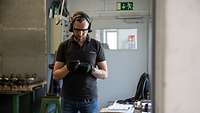




Daniel Schwindling is a civil servant working in the directorate "Technical Quality Management Center" (ZtQZentrum für technisches Qualitätsmanagement) at the Federal Office of Bundeswehr Equipment, Information Technology and In-Service Support (BAAINBwBundesamt für Ausrüstung, Informationstechnik und Nutzung der Bundeswehr).

After 12 years of working in the private sector, Daniel Schwindling joined the Bundeswehr
Bundeswehr/Jörg VollandThe ZtQZentrum für technisches Qualitätsmanagement Directorate has its head office in Lahnstein and operates 23 regional offices at 60 sites across Germany.
These offices are responsible for monitoring on site to what extent companies working for the Bundeswehr have been able to implement the contractually agreed technical properties of their products. In addition, they determine whether the contractors fulfill the organizational requirements for their quality management system.
Moreover, the regional offices place maintenance orders with the industry. These are generally based on open-end maintenance contracts.
Daniel Schwindling works at one of these regional offices of the ZtQZentrum für technisches Qualitätsmanagement Directorate, ensuring reliable ammunition within the scope of his work.
Mr. Schwindling, what brought you to the Bundeswehr?
Even as a child I was keen on taking everything apart and ideally putting it back together - no matter whether it had buttons or movable parts.
The vocational training as an automotive mechatronics technician and further training as an automotive vehicle technician were thus initially perfect for me. But after 12 years in the private sector I wanted to broaden my horizon. I was looking for a new challenge while still working in a technical field.
Consequently, I applied for the intermediate-level technical service and started my Bundeswehr career at the Bundeswehr Mechatronics Center in Jülich.
And how did you come to work in the field of weapons and ammunition?
After my transfer to BAAINBwBundesamt für Ausrüstung, Informationstechnik und Nutzung der Bundeswehr I was employed in the field of technical quality management at the regional office in Cologne. There we support and monitor local companies manufacturing and delivering weapons and ammunition for the Bundeswehr.
In various training courses at the Wehrtechnischen Dienststelle für Waffen und Munition (WTDWehrtechnische Dienststelle 91) in Meppen I obtained the technical expertise and qualification required to work as a quality assurance representative for weapons and ammunition.
What exactly are the tasks of your assignment?
Simply put, the government quality assurance experts ensure that the soldiers are really provided with the contractually agreed and ordered products and services.

Daniel Schwindling is conducting an on-site check of the ammunition at the manufacturer's facilities
Bundeswehr/Jörg VollandOn company visits I verify the required quality, i.e. contractual conformity of the products prior to their delivery to the field units. That is an immense responsibility.
What does the verification at the company involve?
First the product, e.g. ammunition, is registered for a Government Quality Assurance inspection by the manufacturer.

Technical documentation also has to be reviewed within the scope of quality assurance
Bundeswehr/Jörg VollandThe inspection is performed on site at the contractor’s facilities, often alongside production and in several steps. It consists of the participation in company tests, review of test records and complementary government tests. This also includes what is called destructive testing of samples. Destructive testing means trial firing of a certain amount of ammunition.

Some test shots are performed by Daniel Schwindling himself
Bundeswehr/Jörg VollandIf all goes well, the successful Government Quality Assurance inspection is confirmed in writing. However, if the ammunition does not work as it should, the contractor and the Government Quality Assurance representatives jointly investigate the causes until the problem is solved.
We consider the contractors to be strategical partners and part of the Bundeswehr procurement organization. Joint objectives are defined by contract. However, there are sometimes differing interests beyond a joint contract, of course. The basic requirement for cooperation thus always is professional interaction.
What do you enjoy most about your job?
What I like most are the varied activities and getting into contact with different people such as company workers, colleagues from within and outside our agency or members of our NATONorth Atlantic Treaty Organization partners.
Also, each contract, company and product is different. You always have to familiarize yourself with new technical facts. Good cooperation with the technical directorates at BAAINBwBundesamt für Ausrüstung, Informationstechnik und Nutzung der Bundeswehr in Koblenz and its agencies is invaluable and - in my opinion - enormously rewarding.
If you could swap with someone for a month, who would it be?
Since I am a civil servant working in a civilian Bundeswehr career I would like to swap with a “military colleague”, for instance a colleague from the Infantry Training Center in Hammelburg.
Combined with my current experience, this would probably provide me with an even better and broader view of the requirements for the product to be tested, in my case mostly ammunition.
And last but not least: What is your life motto?
Let me quote Albert Einstein. He once said: “If you can't explain it simply, you don't understand it well enough.” And this does not only apply to professional life, but also to private life.